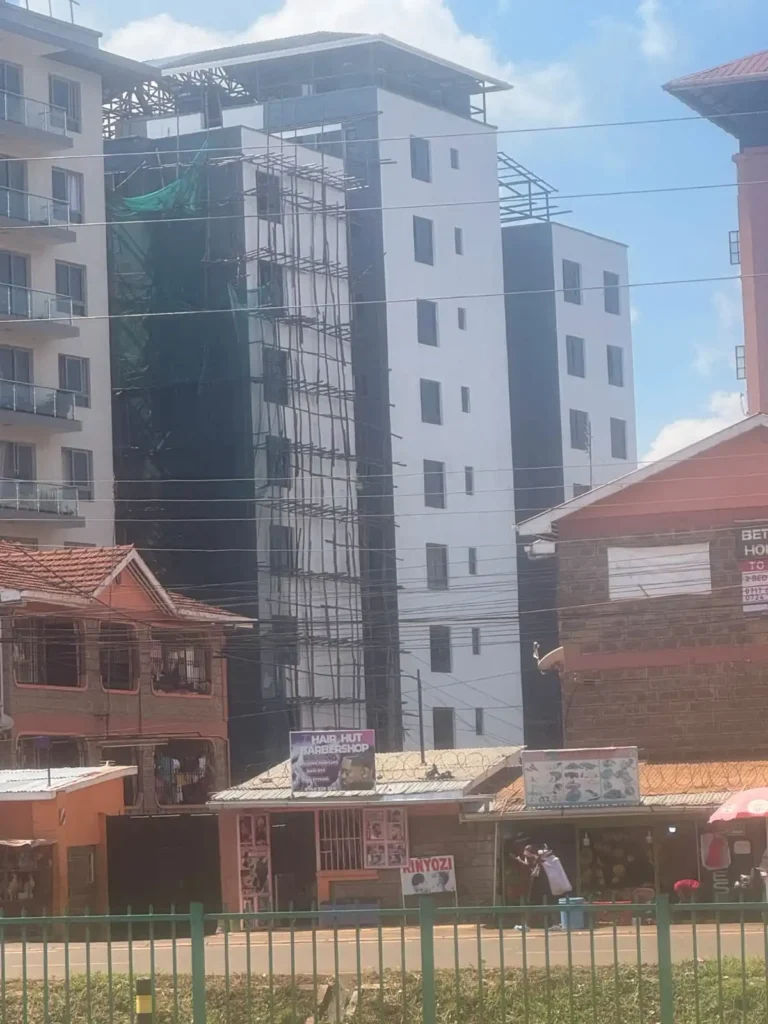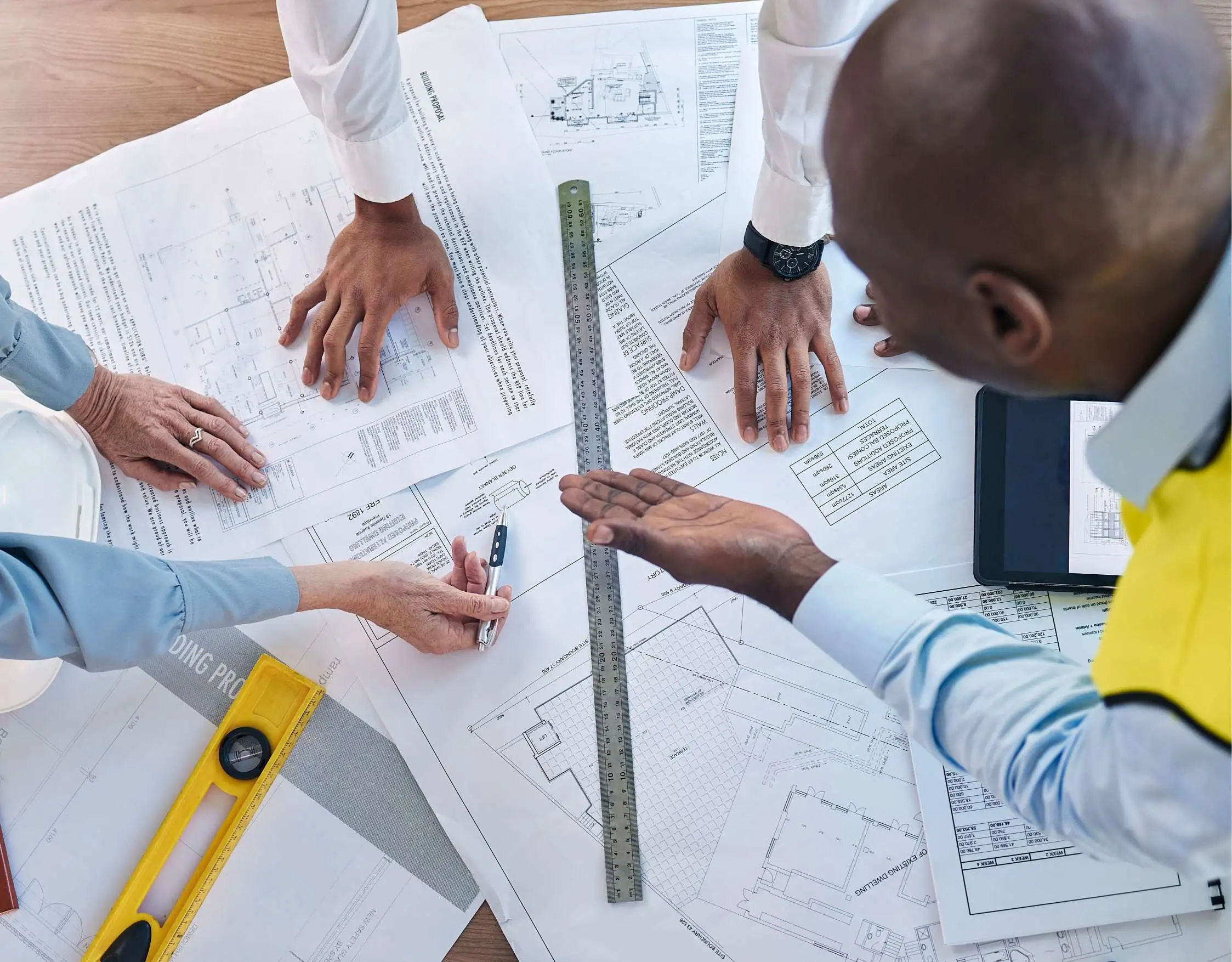Call us: +254723364999
The Dawn of a New Construction Era in Kenya
Kenya’s skylines are changing fast. From the expanding towers of Nairobi, the commercial hubs of Kiambu to the modern estates rising across Nakuru and Eldoret, our cities are growing at a pace never seen before. But with this rapid urbanization comes a challenge; ensuring that every structure built today can stand safely, sustainably, and legally for generations to come.
That’s where the Kenya Building Code 2024 steps in.
This landmark update to building regulations in Kenya marks the beginning of a new era: one driven by higher safety standards, greener materials, and stricter oversight by the National Construction Authority (NCA) and local county governments. For developers, contractors, and property owners, understanding and complying with this new Code isn’t optional; it’s the foundation of doing business right.
At Jokembu Construction Ltd, we view this shift not as a hurdle, but as an opportunity, a chance to lead Kenya’s construction industry into a future defined by quality, innovation, and full NCA compliance.
Because in this new era of construction, compliance isn’t just about following the law; it’s about building trust, reputation, and long-term value.
What Is the Kenya Building Code 2024?
The Kenya Building Code 2024 is the country’s updated national framework that defines how buildings in Kenya should be designed, constructed, and maintained, from the foundation to the finishing stage.
Introduced by the State Department for Housing and Urban Development in partnership with the National Construction Authority (NCA), this Code sets a single, unified standard for all building works in Kenya whether residential, commercial, or public infrastructure.
It officially updates and replaces older, fragmented regulations that had been in use since the early 1960s, many of which no longer reflected the realities of modern construction, urban density, and environmental demands.
The goal of the new Building Code is clear:
- Enhance safety and structural integrity.
- Encourage green, sustainable building practices.
- Streamline permits, inspections, and compliance processes across counties.
- Create a uniform standard that aligns Kenya’s construction practices with global benchmarks.
For developers and contractors, this means every project, from a high-rise in Nairobi or a modern home in Kiambu to an estate in Nakuru, must now follow clear guidelines for materials, design, and professional supervision.
At Jokembu Construction Ltd, we integrate these new standards into every project blueprint and execution phase, thus ensuring our clients meet all NCA building compliance requirements without delays or penalties.
Why the 2024 Building Code Was Introduced
For years, Kenya’s construction sector has been a mix of great ambition and real challenges. Rapid development in cities like Nairobi and Nakuru has fueled massive growth but it has also exposed cracks in the system. Too many projects have suffered from unclear building regulations, unsafe construction practices, and inconsistent county permit processes that left developers uncertain and projects at risk.
The Kenya Building Code 2024 was introduced to fix that.
By bringing all building regulations in Kenya under one modern, enforceable standard, the new Code aims to make construction safer, greener, and more accountable. It’s not just a legal reform; it’s a mindset shift toward responsible building.
Here’s what the new Code seeks to achieve:
- Safety first: Prevent structural failures and ensure stronger foundations through updated construction safety standards.
- Sustainability: Encourage the use of eco-friendly materials and energy-efficient designs for a greener future.
- Accessibility: Make public and private buildings inclusive for all users, including people with disabilities.
- Resilience: Ensure structures can withstand fire, floods, and natural wear through improved engineering standards.
- Uniformity: Simplify county building permits in Kenya by aligning county laws under one national standard.
At Jokembu Construction Ltd, we welcome this reform because responsible, compliant construction isn’t just good business; it’s good citizenship. Every project we undertake now integrates these principles from day one, ensuring full compliance with both NCA and county-level inspection requirements.

What Are the Main Changes in the Kenya Building Code 2024?
The 2024 Code is not just a reprint — it’s a total overhaul of how construction is regulated in Kenya. It introduces new definitions, processes, and professional requirements that every builder, developer, and architect must understand.
Here’s a quick breakdown of the key changes introduced in the Kenya Building Code 2024:
- Updated classification of building types — Residential, commercial, industrial, and mixed-use structures are now more clearly defined for approval and inspection.
- Stricter safety and material testing requirements — All materials must meet minimum construction safety standards verified by certified labs or NCA-approved entities.
- Mandatory registration of professionals — Engineers, contractors, and site supervisors must be registered and licensed under the National Construction Authority (NCA).
- Energy-efficiency and environmental sustainability standards — Projects must now include eco-conscious design features such as efficient lighting, ventilation, and water systems.
- Mandatory inspection and approval stages — Every phase — from excavation to final handover — must be reviewed and approved by county inspectors or the NCA.
- Tougher enforcement and penalties for non-compliance — Projects that violate safety or procedural requirements face stoppages, fines, or even demolition orders.
At Jokembu Construction Ltd, we’ve already adapted our project management workflows to these new standards, ensuring smooth compliance at every stage, from permit application to site delivery.
When clients work with us, they don’t just get construction; they get peace of mind knowing their projects are built according to Kenya’s latest legal and safety benchmarks.
Who Enforces the Building Code in Kenya?
Enforcement of the Kenya Building Code 2024 is a shared responsibility: one designed to ensure that every structure built across the country meets the new national standards for safety, sustainability, and professional compliance.
Here’s how it works:
- The National Construction Authority (NCA)
The NCA is the main regulatory body overseeing the registration of contractors, site supervisors, and construction professionals. It ensures that only qualified and licensed experts handle building projects in Kenya. - County Governments
Each county issues building permits and carries out regular site inspections. County engineers work hand in hand with NCA officials to verify that all projects meet local and national construction safety standards. - The National Building Inspectorate (NBI)
The NBI, operating under the State Department for Housing, steps in to conduct independent compliance checks, especially for large-scale or high-risk projects.
Together, these bodies form Kenya’s compliance ecosystem, a collaboration between NCA regional offices and county departments that ensures every approved project is safe, legal, and sustainable.
At Jokembu Construction Ltd, we maintain direct coordination with both county inspection units and NCA offices across our active project regions. Our teams handle all necessary submissions, follow-ups, and inspection scheduling, thus allowing developers and clients to focus on their vision while we manage the paperwork and compliance.
How Contractors and Developers Can Stay Compliant
Understanding the new Code is one thing while implementing it correctly is another.
For many developers and project owners, the difference between approval and delay often comes down to simple process clarity.
Here’s a practical step-by-step guide on how to stay compliant with the Kenya Building Code 2024:
- Register with the NCA and renew annually
Every contractor and subcontractor must hold a valid NCA license, confirming their technical capacity and compliance history. - Obtain County Building Permits before breaking ground
No construction should begin without the official permit. Each county requires architectural drawings, environmental reports, and NCA registration proof. - Hire qualified professionals
Architects, structural engineers, and site supervisors must be registered under relevant professional bodies and the NCA. Jokembu’s in-house teams already meet these requirements. - Use approved construction materials
The new Code mandates testing for concrete, steel, and roofing materials with official test reports to be filed at each inspection stage. - Follow inspection schedules from foundation to completion
County and NCA inspectors review progress at every phase. Skipping inspections can void your approval or delay occupancy certification. - Keep records and certifications for final occupancy approval
Proper documentation of all permits, test reports, and approvals is mandatory before the county issues the occupancy certificate.
At Jokembu Construction Ltd, our Project Management Services are built around this compliance journey. We guide every client from permit applications to inspection coordination, ensuring a smooth path to approval and project delivery that meets all building regulations in Kenya.
Whether it’s a commercial complex in Nairobi, a residential estate in Naivasha, or a mixed-use project in Limuru, our teams are already aligned with the 2024 standards, guaranteeing efficiency and full compliance from day one.
The Impact of the 2024 Code on Kenya’s Construction Industry
The introduction of the Kenya Building Code 2024 is more than a policy shift; it’s a turning point for the entire construction industry in Kenya.
By setting clear, enforceable standards, the Code restores confidence in the quality and safety of Kenyan-built infrastructure, a critical factor for investors, lenders, and development partners.
1. Boosting Investor and Financier Confidence
When financiers know that projects adhere to national safety and building regulations in Kenya, they are more willing to fund them. This transparency reduces risk, encourages foreign investment, and opens new financing channels for both private and public developments.
2. Driving Sustainable and Affordable Development
The 2024 Code integrates sustainable building standards in Kenya, promoting energy-efficient designs, water conservation, and environmentally responsible construction.
For developers, this creates an opportunity to align projects with Kenya’s Affordable Housing Programme and green financing initiatives, an emerging space where compliance and sustainability go hand in hand.
3. Modernizing the Construction Process
Professional firms like Jokembu Construction Ltd are embracing technology to stay ahead.
We are integrating tools like Building Information Modelling (BIM) for precise project visualization, digital inspection reporting, and online compliance tracking, thus ensuring every phase of construction aligns with NCA and county inspection frameworks.
This digital-first approach not only accelerates approvals but also enhances project transparency, a major trust factor for both clients and regulators.
By adopting modern tools and sustainable practices, Jokembu isn’t just following the Code; we’re shaping what compliance excellence looks like in Kenya’s construction industry in 2025 and beyond.
Common Misconceptions About the New Building Code
Whenever major reforms are introduced, misinformation spreads fast and the Kenya Building Code 2024 is no exception. Below are some of the most common myths, and the truth behind them.
Myth 1: “The new Code only affects large contractors.”
Truth: Every builder, developer, and property owner is affected. Whether you’re putting up a high-rise in Nairobi or a family home in Embu, all projects must comply with the updated safety and material standards.
Myth 2: “It will slow down building approvals.”
Truth: The opposite is true. The 2024 Code actually simplifies the process by setting one national standard. Counties can now issue permits faster because the documentation and inspection stages are standardized across Kenya.
Myth 3: “Compliance will make projects too expensive.”
Truth: Proper compliance reduces long-term costs. Early planning under the new Code helps prevent redesigns, inspection failures, and project delays, thus saving money, time, and reputation.
At Jokembu Construction Ltd, we help clients build right the first time using compliant designs, approved materials, and expert project management to avoid costly rework.
Frequently Asked Questions (FAQ)
What is the Kenya Building Code 2024?
The Kenya Building Code 2024 is a unified set of construction standards designed to ensure safety, sustainability, and quality across all building projects in the country. It harmonizes national and county regulations, guiding everything from design and materials to inspection and occupancy.
Who enforces building regulations in Kenya?
Building regulations are enforced jointly by the National Construction Authority (NCA), County Governments, and the National Building Inspectorate. Each plays a role in approvals, inspections, and ensuring all construction works meet the Building Code 2024 standards.
How do I get a building permit in Nairobi?
You can apply for a building permit through Nairobi County’s eDevelopment platform. You’ll need to submit architectural and structural drawings, proof of land ownership, NCA registration details, and pay the required fees before construction can begin.
What happens if a contractor violates the code?
Violations can lead to penalties, suspension of the project, or even blacklisting by the NCA. In severe cases, unsafe structures may be demolished. Staying compliant protects your investment, reputation, and safety of future occupants.
How does Jokembu Construction ensure compliance?
Jokembu integrates compliance into every project phase; from permit acquisition and documentation to supervised inspections and final certifications. Our teams coordinate with county officials and NCA representatives to make sure every build meets or exceeds Kenya’s 2024 Building Code standards.
Conclusion: Building Kenya’s Future, One Compliant Structure at a Time
At Jokembu Construction, we believe compliance isn’t a burden; it’s the blueprint for progress.
The Kenya Building Code 2024 sets a higher standard for safety, sustainability, and professionalism, and we’re proud to be among the firms leading that charge.
Whether you’re a developer, architect, investor, or home builder, our team helps you:
- Navigate every approval step confidently.
- Integrate sustainable and compliant building practices.
- Deliver projects that stand the test of time and regulation.
Planning your next project?
Talk to our compliance-ready construction experts we’ll help you build it right, the first time.

